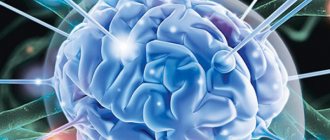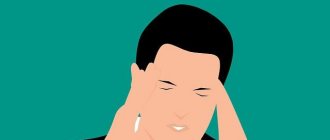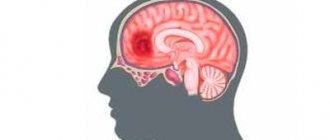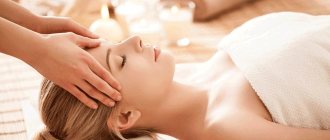The brain is the main organ of the human central nervous system, consisting of many nerve cells - neurons. By interacting with each other using special impulses, brain cells control the functioning of the entire body, including coordination and control of movements, processing of information from the senses, perception and generation of speech, positive and negative emotions, mental functions, attention, memory, etc. d.
Brain weight ranges from 1000 to more than 2000 g, which on average is 2% of body weight. The volume is 1250-1600 cm3 and occupies most of the cranium.
The brain consists of five sections:
- oblong;
- posterior – pons, cerebellum, pineal gland;
- average,
- intermediate;
- anterior - cerebral hemispheres.
Despite the fact that recently science has made great strides in studying the functioning of the brain, its parts and individual cells, how, as a result of the interaction of billions of neurons, the brain functions as a single whole is known only in a very simplified form.
Normal blood circulation, which is ensured by healthy blood vessels, plays an important role in brain function. And, despite the fact that there are many brain diseases, the most widespread are diseases associated with circulatory disorders, such as atherosclerosis, stroke, migraine, etc.
Traditional medicine over the centuries has accumulated a large number of recipes for herbal treatment of brain diseases, as well as for prevention and healing. Official medicine has recognized the effectiveness of many of them, and currently there are pharmaceutical drugs based on them.
Herbs for brain diseases, unlike their chemical analogues, are completely natural, act gently but effectively, give stable and long-lasting results, and can, if not cure completely, then significantly improve the patient’s condition, especially for minor ailments. An important point is the absence of side effects and a small number of contraindications.
What brain diseases are treated with herbs?
First of all, herbs for the brain have proven their effectiveness in eliminating ailments such as headaches, migraines, dizziness, fainting, including chronic ones, especially if they are associated with overwork, stress, cerebral vascular spasms, in weather-dependent people, etc.
Also, good results are observed when using traditional methods of treating brain diseases resulting from circulatory disorders, for example, atherosclerosis, hypertension, etc., especially at the initial stage. Herbal treatment of the head helps cleanse blood vessels, improve their condition and tone.
And, of course, herbs for treating the brain are recommended to be used in courses for preventive purposes to improve health, as well as increase brain activity and memory. This is especially true for people who have familial vascular diseases.
In all other cases, treatment of brain diseases with herbs can only act as an addition to the main, medicinal, method of treatment. This applies primarily to diseases that threaten acute cerebrovascular accident and stroke.
It should also be remembered that seemingly harmless, but often recurring ailments such as headaches, fainting, etc. can signal the presence of serious diseases such as a cyst or brain tumor, when systematic and targeted drug treatment is indispensable.
In addition, there is a group of diseases that mainly affect older people, in which degenerative changes occur in the brain. This is primarily Alzheimer's disease. Symptoms of such disorders are sudden mood swings, attacks of unreasonable aggression, persistent memory impairment, etc. Although modern medicine has not yet found a means to treat such diseases, with timely treatment, the course of the disease can be slowed down and the manifestations of symptoms reduced.
Therefore, if you have persistent, frequently recurring ailments associated with the brain, as well as any suspicious symptoms, it is better to consult a doctor, get tested and undergo examinations to make sure there are no serious diseases, and if they are present, begin immediate treatment.
Green tea
Green tea affects the body and brain no worse than coffee. But in addition to caffeine and antioxidants, it also contains the amino acid L-theanine, which reduces anxiety by stimulating the neurotransmitter GABA and increasing the frequency of alpha waves, promoting relaxation and reducing feelings of fatigue.
But note that if coffee helps you cheer up, then green tea, on the contrary, helps you relax and fall asleep faster. In addition to this, this drink has a wonderful effect on memory. It also cleanses blood vessels and normalizes the functioning of the gastrointestinal tract.
What to pay attention to
No matter how harmless medicinal plants may seem, they are also medicines, some of which are potent, toxic and even poisonous. Therefore, before you start taking them on your own, you should consult with a doctor you trust, or better yet, a herbalist.
The doctor will select herbs and herbs that are effective for this particular disorder, the required dosage, and prescribe a course of treatment. Brain diseases in older people often occur in parallel with other chronic diseases. It is important to consider contraindications and possible side effects.
Herbs for the treatment of brain diseases should be used with extreme caution in children, people prone to allergic reactions, and during pregnancy, as many of them have an abortifacient effect.
Eggs
Eggs are a source of a huge amount of brain-healthy substances, including choline, folic acid, vitamins B6 and B12. Choline is a micronutrient involved in the synthesis of acetylcholine, which regulates memory and mood. By the way, it is one of the substances that enters the body less often.
As for B vitamins, they also play an important role in brain health. They prevent unfavorable age-related changes and prevent the development of dementia (acquired dementia), depression and anxiety, which are often a serious cause of distractibility and decreased concentration.
Herbs for stroke
Stroke – “cerebral”, apoplexy – a sharp disruption of blood circulation in the brain due to hemorrhage, thrombosis, resulting in damage to brain tissue and disruption of its functions.
The cause of a stroke may be hypertension, cerebral atherosclerosis, cerebral aneurysm, severe anxiety, or stress.
Due to the seriousness of the disease, which can be fatal, at the slightest suspicion of a stroke, you should immediately call an ambulance. The sooner qualified first aid is provided, the less negative consequences for the body will be.
Treatment of stroke with folk remedies is carried out after stabilization of the patient’s condition and consultation with the attending physician. Treatment of stroke using traditional methods, as an addition to the main drug treatment method, promotes a speedy recovery and reduces the consequences for the body.
Recipes for treating stroke with herbs
Recipe 1
1 tsp Pour 200 ml of evasive peony (roots). boiling water, cover with a lid, wrap and leave for 1 hour. Strain.
Take 1 tbsp. 4-5 times a day.
Recipe 2
1 tbsp. Pour 250 ml of celandine (herb). boiling water, cover with a lid, insulate and leave for 15 minutes. Strain.
Take 30 ml. 3 times a day before meals. The course of treatment is 2-3 weeks.
Herbal oil for stroke
In a glass jar 30 g. pour 250 ml of ground bay leaf. vegetable oil, mix well. Close the container tightly with a lid and leave in a dark place at room temperature for two months, remembering to shake every day. Strain. Bring the resulting oil to a boil, cool.
Use for daily rubbing into paralyzed areas.
Review of 3 herbal pharmaceutical preparations
The modern pharmaceutical industry offers a large number of medications to normalize cerebral hemodynamics. The most pronounced effect is exerted by vasodilators, nootropics and psychostimulants, but even a number of drugs have been created from plant materials. The most effective are:
- Memoplant forte. Contains extract obtained from Ginkgo Biloba leaves. Helps normalize metabolic processes in the central parts of the nervous system, improve microcirculation, increase memory and perception of information. Indicated for the treatment of dementia (senile dementia), Raynaud's syndrome, obliterating atherosclerosis of the vessels of the lower extremities and carotid arteries.
- Dionorm. The active ingredients are the fruits of Ginkgo biloba, Japanese sophora, Baikal skullcap, Dioscorea gilponica and Daurian cohosh. Recommended for use by elderly people. The drug reduces the intensity of degenerative diseases, improves metabolism at the level of neurocyte membranes and reduces the resistance of the vascular wall of the microvasculature.
- Bravinton. Contains vinca alkaloids and has an antispasmodic effect. The effect leads to an increase in the speed of peripheral blood flow and increased oxygenation of brain tissue.
Herbs for headaches
Headache is a very common ailment and is a symptom of a wide range of diseases, but it can also occur in healthy people, for example, after emotional stress, physical or mental stress, heat or sunstroke, malnutrition, poisoning, allergic manifestations, and can signal slagging. body.
As a symptom of diseases, malaise occurs with influenza and other colds, high blood pressure, concussion, excess or, conversely, lack of blood in the vessels of the brain, spasms of cerebral vessels, etc. In people who spend a long time at a desk, headaches give be aware of congestion in the muscles of the shoulders and neck, but may also indicate the presence of cervical osteochondrosis.
In addition, frequent persistent severe headaches are a symptom of diseases such as meningitis and various brain tumors.
Recipes for treating headaches with herbs
Recipe 1
1 tbsp. lemon balm (herb) pour 250 ml. boiling water, cover, wrap and leave until cool. Strain.
Take half a glass 3 times a day before meals.
This remedy also has a good effect for treating dizziness at home.
Recipe 2
1 tbsp. hawthorn (fruit) pour 250 ml. water, bring to a boil and simmer over low heat for 15 minutes. Remove from heat, cover, wrap and leave until warm. Grind the berries with a spoon, stir the liquid and strain. Squeeze out the raw materials. Bring the resulting broth to its original volume using boiled water.
Take 0.3-0.5 tbsp. 2-3 times a day half an hour before meals.
Treatment of headaches with herbs (collection)
Make a collection of the following plants, taken equally (by weight): chamomile (flowers), mint (leaves), fennel (fruits), valerian (root).
2 tbsp. collection, pour half a liter of boiling water. Cover with a lid, insulate and leave until cool. Strain.
Take 1 tbsp. warm to relieve fatigue and stress, in the evening, or better yet at night.
Fatty fish
Fatty fish is one of the most beneficial foods for the brain in general and for attention and concentration in particular. Sardines, trout, salmon and other fatty fish are rich in omega-3 fatty acids. These acids improve the ability to perceive and assimilate information and memory.
These same acids are used by the body in the production of nerve cells. They slow down the mental decline associated with age-related changes and prevent the development of Alzheimer's disease. A lack of these acids can lead to decreased brain performance and depressive states.
Herbs for migraines
Migraine is a type of severe, prolonged headache (sometimes up to several days), which is limited to one side of the head, often accompanied by nausea and vomiting. It occurs due to periodic narrowing and expansion of the arteries of the brain, as a result of which the tissues swell. In severe cases, changes in the brain may occur. Women are more susceptible to migraines.
The exact cause of the disease is not known, but certain food products, medications, anxiety and stress, overwork, lack of sleep, overheating, etc. can be provoking factors for the onset of an attack.
Herbs for migraines help relieve an attack, and when taken in a course, prevent their occurrence.
Recipes for treating migraines with herbs
Recipe 1
1/2 tbsp. peppermint (herb) pour 200 ml. boiling water, cover with a lid, insulate and leave until cool. Strain.
Take 0.3-0.5 tbsp. warm 1-3 times a day before meals.
Mint is a folk remedy for treating headaches, relieving emotional stress, and helping to calm down and relax. To do this, when brewing black or green tea, add a pinch of mint to the cup. Tea must be freshly brewed.
Recipe 2
Prepare an infusion of three-leaf watch (leaves) according to the previous recipe at the rate of 1 tbsp. raw materials per 250 ml. water.
Take half a glass twice a day half an hour before meals.
A decoction, as a traditional medicine for the treatment of migraines, has an analgesic, anticonvulsant effect, and relieves vascular spasms.
Herbal collections for the treatment of migraines using folk remedies
Collection 1
Make a collection of the following medicinal plants, taken in equal quantities (by weight): birch and marshmallow leaves, immortelle flowers, valerian rhizome, lemon balm and meadowsweet herbs.
In a thermos 1 tbsp. collection pour 400 ml. boiling water, leave for 3 hours. Strain.
As a folk method for treating migraines, take half a glass hot during an attack every one and a half to two hours.
For preventive purposes, take half a glass warm 3-4 times a day after 20 minutes. after meal.
Collection 2
Medicinal herbs for migraines in the form of preparations have a good effect in preventing an attack.
Combine the following plants in equal quantities (by weight): birch leaves, tansy flowers, sweet clover herbs, dried herbs and tripartite string.
In a thermos 0.5 tbsp. collection pour 300 ml. boiling water and leave for 2 hours. Strain.
Take 100-125 ml warm. three times a day after meals.
Greens and leafy vegetables
Green onions, parsley and dill are an inexhaustible source of antioxidants and carotenoids that improve brain function. Our ancestors knew about their beneficial properties. This is probably one of the reasons why greens have always been the most important ingredient in a huge number of dishes.
No less useful are arugula, corn, lettuce and spinach, so popular in the West. In general, they need to be included in the diet even more often, because they contain B vitamins and folic acid, which have a positive effect on attention, memory and general brain health. It’s worth remembering: the darker the color of the green, the better.
Herbs for dizziness
Dizziness, like headache, is a very common symptom and is often accompanied by nausea, vomiting and severe weakness. There are many reasons for the occurrence of both isolated and frequent dizziness.
In healthy people, dizziness can occur in stuffy and enclosed spaces, especially in large crowds of people, at high air temperatures, as a symptom of heat or sunstroke, in stressful situations, with fatigue, impaired muscle tone, etc. Malaise can signal a decrease in hemoglobin in blood.
In addition, the cause of dizziness can be migraines, ear inflammation, cervical osteochondrosis, circulatory disorders in the brain, high or low blood pressure, atherosclerosis, epilepsy, etc.
Frequently recurring dizziness can signal the presence of a tumor or inflammation of brain tissue, etc. Sudden loss of consciousness is one of the manifestations of a stroke.
Recipes for treating dizziness with herbs
Recipe 1
1 tbsp. Pour 250 ml of meadow clover (inflorescence). water, bring to a boil and simmer over low heat for 1 minute. Remove from heat, cover with a lid, wrap and leave for 1 hour. Strain.
Take 30-45 ml. 3-4 times a day after meals.
Clover infusion is also used to treat cerebral atherosclerosis, especially at the initial stage, and tinnitus. In addition, it helps improve brain function and memory.
Recipe 2
1 tsp parsley (seeds) pour 200 ml. boiled water at room temperature, stir. Leave for 8 hours in a warm place. Strain.
Take 1 tbsp. every 2 hours
Treatment of dizziness with folk remedies (herbal collection)
1 tbsp. pour a liter of boiling water over the flowers of hawthorn and meadowsweet, motherwort grass and rose hips. Cover with a lid, insulate and leave for a day. Strain.
Take 1 tbsp. 3 times a day half an hour before meals. The course of treatment is 3 months.
Dark chocolate
Dark chocolate, like cocoa, includes a whole range of beneficial substances for the brain - these are antioxidants, caffeine and flavonoids - a special type of plant antioxidants. They have a beneficial effect on the areas of the brain responsible for memory and learning. They also slow down the aging process of brain cells.
And, of course, we can’t help but remind you that dark chocolate is also a great way to improve your mood. During breaks from work, eat a few pieces of chocolate. You can even combine this with the use of techniques to combat distractions - you will benefit the body and have fun at the same time.
How to improve brain function with herbs
Recipe 1
Pine needles are a well-known folk remedy for improving brain function and memory. For the composition, the greatest effect is exerted by young, up to 10 cm, pine shoots, preferably fresh. The shoots keep well for up to a week on the bottom shelf of the refrigerator.
In the evening 5 tbsp. chopped pine needles or young pine shoots, 3 tbsp. rose hips and 2 tbsp. Rinse the onion peels well several times. Pour 750 ml. water, bring to a boil and simmer over low heat for 10 minutes. Remove from heat, cover with a lid and insulate with a warm blanket folded in several layers, plus a pillow. In the morning, strain and squeeze out the raw materials. Using boiled water, bring the resulting broth to its original volume.
Take, starting with half a glass, 3 times a day, gradually increasing the dosage, depending on how you feel.
Treatment is long-term – from 3 months or more.
The collection cleanses blood vessels well, relieves spasms, as a result of which headaches disappear and general condition improves.
Recipe 2
As a folk remedy for improving brain function and memory, it is recommended to use the following collection of herbs, taken in the following proportions by volume: bergenia - 4 parts, lingonberry and raspberry leaves - 1.5 parts each, oregano herb - 1 part.
1 tbsp. collection, pour half a liter of water, bring to a boil and simmer over low heat for 15 minutes. Remove from heat, cover, wrap and leave until cool. Strain.
Take 1 tbsp. 3 times a day. The course of treatment is 3 weeks and is carried out no more than twice a year.
Contraindications. The decoction is contraindicated for people with heart and stomach diseases, as well as during pregnancy and breastfeeding.
Recipe 3
Good herbs for improving brain function are sage and peppermint. In the evening, 1 tbsp. pour half a liter of boiling water over plant leaves. Cover with a lid, wrap and leave until morning. Strain.
Take 50 ml. 3 times a day half an hour before meals. The course of treatment is 15 days, a month break, then the course is repeated.
Broccoli
Broccoli also contains a lot of useful substances, including unique antioxidants. It is especially important that literally 100 grams of this product contains over 100% of the daily requirement of fat-soluble vitamin K, necessary for the formation of sphingolipids (these are fats found in brain cells).
Broccoli has an excellent effect on memory, has an antioxidant and anti-inflammatory effect, and enhances the body's ability to fight brain damage. It is recommended to include broccoli in your daily diet and consume it during periods of increased stress and fatigue.
Blueberry
Blueberries are beneficial both for the body in general and for the brain in particular. It contains a high content of anthocyanins - plant substances with antioxidant and anti-inflammatory effects. They prevent the development of neurodegenerative diseases and slow down the aging process of the brain.
Thanks to the antioxidants contained in blueberries, this berry helps improve connections between brain cells, improves concentration and memory. Today, by the way, blueberries are actively used in medicine, because they have proven themselves to be an effective remedy in the fight against short-term memory loss.
Nuts
Eating nuts is an excellent prevention of heart disease and an activator of effective brain function. They contribute to a significant improvement in cognitive abilities and prevent the development of neurodegenerative diseases. Regular consumption of nuts improves memory.
Nuts are a source of vitamin E, antioxidants and various healthy fats, including omega-3. It’s not just that walnuts look like the brain, because with every nut eaten, brain function improves. Other healthy nuts include hazelnuts, peanuts, pine nuts, and almonds.








